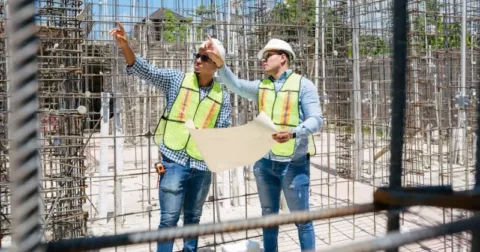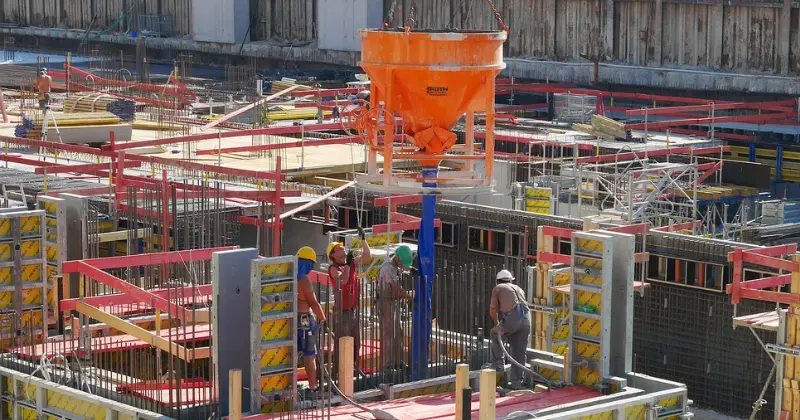10 mins read
How to Start a Construction Company: Establishing a Successful Business from the Ground Up

Starting a construction company can be an exciting and lucrative endeavor. Whether it is your first step into the construction industry or your next logical step after building a career as an individual contributor, the possibilities are nearly endless. Every new business brings inherent challenges and risks, so it is important to find timely information on business formation, specialties, and trends while networking with those who have already blazed a successful trail. We break down some of the important considerations for prospective business owners in the US, UK, and South Africa.
How to Start a Construction Company: Top 9 Tips

Unlike the majority of the 800,000+ businesses launched each year around the world, construction companies usually interface directly with physical infrastructure and industry regulations that require additional controls and resources. The basic steps involved in planning, funding, and operating a business can seem a bit overwhelming, but a step-by-step approach helps to simplify the process of turning a great business idea into a reality.
1. Research the industry
Before deciding on when and how to open a construction company within your specialty, you should do some research on the competitive landscape, industry trends, labor statistics, and the tasks you will need to complete prior to setting up shop and taking on new clients. Important topics to include in your research include:
- The number and size of similar businesses in your area
- Expected demand for your services in the future
- The availability and typical wages for workers you may need to hire
- Legal requirements, including contractor licenses and permits
- Emerging trends in the construction industry
In some cases, research might lead you to conclude that your concept is not viable, but that is not always a bad thing. Changing courses before launch is much easier than redefining an existing business. Detailed research gives you the best odds of success.
2. Find your niche
Diligent research also helps pinpoint the niche or specialty you should focus on. In some cases, this is simply turning years of experience as a roofer, bricklayer, carpenter, or green building designer into an exciting new business. Depending on market conditions, finding the right niche can also mean discovering an unmet need and developing the skills and tools to capitalize on it.
As you decide on a specialty, it is important to make sure you have the necessary knowledge and licensing to become a recognized expert in your field. If you need to hire outside consultants or in-house experts to make this happen, the costs of specialization should be carefully weighed against the benefits.
3. Write a business plan
With your concept of how to start a construction business firmly in hand, the next step is creating a detailed business plan. The length and scope of the plan will vary depending on the size and specific type of construction company you are forming, but should always include the following sections:
- Executive summary to introduce the business concept and mission statement
- Company overview to describe the business function and type (LLC, S-Corp, C-Corp, etc.)
- Market analysis to define the unmet need and potential for growth
- Marketing strategy to define how the brand will be established to attract customers
- Financial projections, including realistic net and gross profit margin expectation
A good business plan takes time to complete, but it is also one of the most valuable things you can do to clearly define your business model and explain the concept to prospective investors, partners, or employees. A polished business plan shows that you are serious about the new company and have done your homework.
4. Register your business
Registering a business is not difficult once you have decided on the business structure that makes the most sense for your purposes. A sole proprietorship requires very little (or no) paperwork but leaves the owner liable for business risks. This drawback leads many small construction companies to file additional paperwork to form a limited liability corporation (LLC) in the US or a limited liability partnership (LLP) in the UK.
Corporate business structures, including S Corporations and C Corporations, protect individual owners from risk and are suitable for businesses planning to raise capital from investors, although the requisite paperwork is more complex and expensive to file. Each country has its own business structure alternatives based on regional laws, with similar options for owners based on business size and complexity.
5. Get all legal documents
Once you have registered the business, you need to ensure you have all the relevant licenses, certifications, and permits for your specialty. This might include private and government contractors’ licenses, specialty licenses and certifications for your line of work, and insurance policies to cover accidents and emergencies, as well as unemployment and disability insurance if you plan on hiring a staff.
All legal documents must be complete before taking on clients, so it is a wise practice to review government websites, consult with trade associations, and talk to contractors or business owners in your field to ensure you have everything covered. If you are starting a larger business, operating in a high-risk specialty, or just want a second opinion, it might also be advisable to meet with a construction attorney to verify everything is in order. Supporting yourself with professional construction document management software is a good practice to prevent any information loss and keep everything organized.
6. Get funding
As you learn more about how to establish a construction company that is successful, you will probably be creating a long list of tools, equipment, and materials you need to get started, not to mention any office space or other infrastructure you will need for day-to-day operations. Some construction companies rely on the personal assets of the owner’s inner circle to launch the business, but others will require outside funding.
Small business loans, equipment loans, and vendor financing are some of the common options for overcoming these initial financial hurdles. While loans take a bite out of cash flow once monthly interest payments begin to kick in, useful options like vendor financing and purchase order financing allow you to defer upfront project costs until you are paid in full by the client.
7. Invest in software and technology
Depending on the size and specialty of the business, the technology you will need could include anything from laser levels and GPS systems to cutting-edge machinery like aerial surveying drones and autonomous bulldozers. As part of the planning process, it is a good idea to spend time researching alternatives for the tools and equipment you need so you can investigate financing, leasing, and second-hand purchasing options.
There is also a wide variety of construction software solutions available to assist with common tasks like accounting, project management, material tracking, and bidding. These tools make it easier to complete essential day-to-day tasks while devoting more time and energy to building a brand and landing new projects. Building design and architectural firms might also incorporate advanced software tools like building information modeling (BIM) into their business model.
8. Hire a team
Unless you plan to go it alone as a sole proprietor, starting a construction company also requires recruiting, hiring, and other personnel-related tasks. The hiring process takes time since it can be difficult to attract talented individuals to an unproven company, even when competition for workers is less intense. Start by researching wages and benefits for similar positions in your area so you can offer an equally attractive package.
Hiring a great team also means investing in health insurance plans, bonus programs, disability coverage, and other perks that set you apart from similar companies. Use job boards and recruiting websites to spread the word about your openings and tap into vocational schools and apprenticeship programs to find motivated workers eager to gain experience. Along with relevant experience, a positive mindset and willingness to learn are important traits to look for during the interview process.
9. Look for projects
Of course, every new construction company needs new projects to earn money and begin building a reputation. If you have spent your career developing expertise in a construction specialty, sales and marketing tactics may not be second nature. However, every new business begins its journey by sharing its story with prospective clients to open new doors and build new networks of contacts and clients.
In addition to old-fashioned legwork and relationship building, there are many online tools and platforms available that can help you find projects open for bid in your area. Construction journals can also be a good source of information, including key contacts, specifications, and bidding deadlines for new projects. Filtering tools help zero in on projects consistent with your staffing, specialty, and price expectations.
Our guide on how to win tenders can also provide valuable insights to help you get ready to earn projects!
How to Start a Construction Company in the US
Learning how to build a construction company that stands out in a sea of competition can be challenging. Over 740,000 such businesses already operate in the US, with more springing up each day. Like any highly competitive industry, information is king when it comes to conducting research, streamlining business registration, and finding appropriate funding sources.
Networking and internet searches can go a long way towards filling in the blanks, but they also help identify reliable and timely sources of information created specifically to help new business owners. The time you save on planning and research could be the time you need to hit the ground running ahead of the competition.
Where to get information
The US Small Business Administration (SBA) offers customizable business plan templates, online learning portals, and market research tools such as SBA SizeUp. The SBA also guarantees small business loans and provides assistance in locating federal, state, and local construction contracts.
The U.S. Bureau of Labor Statistics (BLS) is another valuable resource for new companies. It provides free information on employment levels, job growth projections, wages, and cost trends within each specialty. This current and accurate information supports business planning, financial projections, and employee hiring practices.
Where to register
After you have finalized your choice of business structure, you will need to go through the process of formally registering the business. For a sole proprietor, this is a simple matter of pulling a business license from your state of residence and an employee identification number (EIN) from the IRS. An LLC will also need a unique EIN, along with a certificate of formation and (optional) operating agreement, which the state government manages.
Things get a bit more complicated if you choose to form an S-Corp or C-Corp since you will also need to file articles of incorporation with the state government and register as a corporation with the IRS for tax purposes. The SBA can also be a great resource for those starting a construction company as they navigate the registration process.
Where to get funding
Securing funding without significantly hampering cash flow can be challenging, especially for companies with no previous track record to influence investors. Construction business loans are available from many local banks for well-qualified lenders, while SBA loans backed by the government are worth exploring for new businesses with a sound business plan in hand.
Many grants are also available for businesses that serve an important social purpose, such as creating jobs in underserved communities or encouraging sustainable construction practices. Federal grant databases like Grants.gov provide useful information on available grants and qualification requirements.
Where to get projects
Even the most innovative and compelling new construction businesses can’t survive without a steady flow of projects to generate revenue and keep workers engaged. Networking opportunities like trade shows and conferences can help you spread the word about your new company.
In the digital age, all new businesses, especially those focused on private residence renovation and remodeling, should spend time optimizing and promoting their website to attract new customers. Contractors seeking bidding opportunities also find tendering websites like constructconnect.com and constructionwire.com useful for reviewing many potential project opportunities at once.
How to Start a Construction Company in the UK
Is starting a construction company in the UK much different than in the US? While there are definite similarities, there is also some specific information and resources you need to be aware of if you plan to set up shops in the UK. This includes country-specific regulations, business registration processes, permitting standards, and the nature of the market itself.
Where to get information
The UK offers various government services and online platforms to help prospective owners learn how to start a construction company in UK fashion. For general information on new business formation, legal structures, and business plans, Companies House (Gov.uk) is a terrific free resource. Each region’s local chamber of commerce offers additional business advice and support, while Building.co.uk provides limitless construction industry case studies and examples.
Where to register
The United Kingdom’s construction industry is tightly regulated, so it is important to follow the correct registration process for your business type. Much like the US, options include individual business licenses (sole traders), limited companies that are legal entities apart from their owner(s), and corporate structures intended for larger operations.
Companies House is the first stop for business registration, but larger or more complex businesses also need to register for value-added tax (VAT) and construction industry scheme (CIS) purposes through His Majesty’s Revenue and Customs (HMRC).
Where to get funding
In addition to traditional bank loans and lines of credit, the British government also offers several funding alternatives for new construction companies, including grants, government-backed startup loans, and tax incentives. Companies House includes a searchable database of loans, grants, and other financing options. Once again, a solid business plan is one of the most important prerequisites for securing financing.
Crowd funding and peer-to-peer loans can also be viable options for new construction businesses in the UK. Online resources such as Funding Circle have been established as peer lending resources for small to medium-sized construction firms.
Where to get projects
Many useful resources are available to help locate new construction opportunities in the UK. Construction Map is an interactive online tool that allows you to type or click on a specific area to find details about ongoing projects in that area, including project names and client contact information. For smaller businesses in the UK, websites and social media are becoming the primary tools for reaching an audience and showcasing previous work.
How to Start a Construction Company in South Africa
South Africa is an exciting and lucrative place to start a new construction business, with the industry projected to grow continuously through 2028. Government and public investment in sustainable building practices, new housing, and infrastructure are driving much of this growth. Starting a business in South Africa means paying close attention to local laws, customs, and industry standards.
Where to get information
The best way to learn how to start a construction company in South Africa is to review successful examples and meet with other local business owners. Events like Big 5 Construct South Africa provide a convenient opportunity to network with other owners and suppliers and learn about the latest trends. The Master Builders South Africa (MBSA) website is also a great resource for finding guidance on company formation or regional standards and connecting with a wider network of construction industry professionals.
Where to register
Business registration in South Africa is a multi-step process that varies in complexity depending on the type and structure of the company. Sole proprietorships and Pty Ltd companies (similar in structure to limited companies or LLCs) must register with the Companies and Intellectual Property Commission (CIPC).
The CIPC is also a good source of general information on registration, business formation, and many other topics. Co-operative and Non-profit business structures are additional alternatives for larger businesses with multiple owners, while a Public Company structure allows shares to be traded on the stock exchange after a more complex and costly registration process is completed.
Where to get funding
Private and government funding options in South Africa are plentiful, yet another benefit of operating in this fast-growing region. Registered businesses are eligible for grants, loans, and even equity funding directly from the South African government. Traditional bank loans are another viable option for owners with solid business plans and collateral. Those starting a construction company in South Africa geared towards new or sustainable technology might also consider partnering with the growing list of angel investors.
Where to get projects
The Construction Industry Development Board (CIDB) maintains a centralized list of public sector tenders, along with a grading system that allows businesses to qualify for more opportunities as they build their reputation. Additional tender portals in South Africa, such as TendersOnTime and SA-Tenders, make it easier to locate both private and public sector opportunities. In South Africa, as in any other country or region around the world, the value of networking and relation-building in finding ongoing work can never be overstated!
Conclusion
The innovative portfolio of RIB software includes many essential tools and capabilities new businesses need to gain a foothold in the industry. From accounting and bid management to estimating, takeoff, and project management, RIB provides the right combination of construction software solutions for businesses of any size or specialty.
It’s never too early or too late to transform the way your business operates by putting the best collaboration, tracking, and analysis tools to work. Join the 23,000+ companies that trust as their preferred software provider and get your free demo for RIB’s toolkit today!
Most Recent
10 mins read
11 mins read
11 mins read
10 mins read
Blog Categories

Ebook











